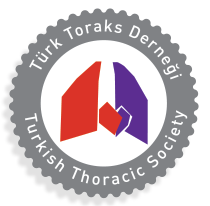Abstract
Abstract
OBJECTIVE:
The effects of long term oxygen therapy (LTOT) accompanied by respiratory failure in COPD patients, the patient's adaptability, quality of life and the effects on survival were investigated in this prospective cohort study.
MATERIAL AND METHODS:
Fifty four COPD patients in whom LTOT was indicated were recruited to the study between February 2006 and July 2007. Patients received two control visits at 5 and 10 months, and were followed for approximately 19 months. Echocardiography was performed and the dyspnoea score (Medical Research Council, MRC) and St. George Respiratory Questionnaire (SGRQ) were applied at the initial and control visits. In addition, the duration of oxygen treatment and indication for maintenance of LTOT was evaluated.
RESULTS:
The mean age of the patients was 64 years; 7 were female and 47 were male, respectively. The mean duration of oxygen treatment prior to the first and second control visits were 9.8 and 10.6 hours, respectively. The percentage of effective LTOT (15 hours or more) use at the first and second control visits were 31% and 46%, respectively. There was no statistically significant difference in the survival of patients who were using oxygen treatment efficiently and inefficiently. The mean basal value of pulmonary arterial pressure was 50 mmHg in patients using effective LTOT, which was significantly reduced to 40mmHg at the second control visit (p=0.01). At the second control visit, the SGRQ symptom scores were better than the basal values (p=0.005).
CONCLUSION:
The LTOT was low in the study patients. Although there was a decrease in pulmonary artery pressure and an improvement in the life quality of patients as a result of LTOT use, LTOT did not affect the survival of patients.



